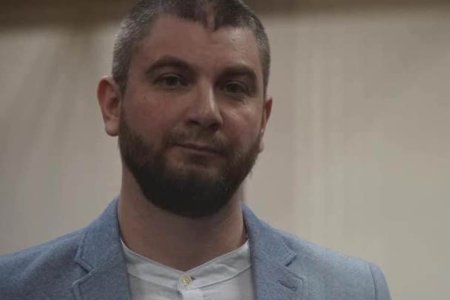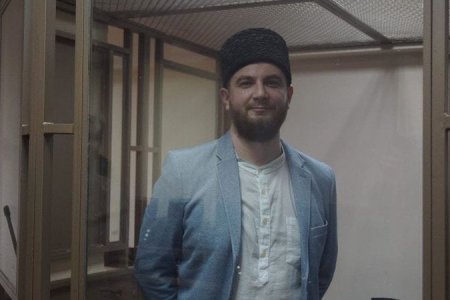
Russia’s vengeance against Crimean Tatar civic journalists and activists who refuse to remain silent about the mounting repression in occupied Crimea does not end with their fake trials and horrific sentences. Seiran Saliyev has been held in the appalling conditions of a Russian SHIZO, or punishment cell, since 20 November 2024, with the prison administration not even trying to find plausible pretexts and his wife in no doubt that the punishment regime is politically motivated.
Mumine Saliyeva, herself a renowned human rights defender, reported on 26 January that the family had only learned that her husband had been placed in a SHIZO isolation cell a month and a half after the first 15-day sentence was imposed. Prior to this the head of the Tula region prison colony No. 4 had simply not answered the calls made by Seiran’s mother, Zodiye Saliyeva.
The prison staff are also in no hurry to answer the formal letters Mumine has sent on numerous occasions, with responses needed in order to lodge legal challenges. On 10 January, she finally received confirmation that a prison colony commission had, on 21 June 2024, ordered that t Saliyev be moved to ‘SUS’, a regime involving even harsher conditions. It was claimed that Saliyev was a ‘persistent offender’, although no specific details were provided of any alleged ‘offence’.
Then on 21 January, Mumine received a response to another letter. This asserted that, on 8 January 2025 Saliyev had “committed an infringement of the prison rules’, and that the prison colony commission had, the following day, placed him in SHIZO. No mention was made of the fact that Saliyev had been held in such a punishment cell since 20 November 2024, with this meaning that he had been ‘sentenced’ to a whole series of 10 or 15-day terms, one after the other.
Enough is known about the pretexts used to place Crimean Tatar and other Ukrainian political prisoners in SHIZO to be near certain that the reasons here were equally fabricated. In December 2024, Muslim Aliev, a recognized Amnesty International prisoner of conscience and fellow political prisoner Teymur Abdullayev were thrown into SHIZO. The excuse was that the two devout Muslims had failed to greet the prison head who had turned up while the men were carrying out their morning prayers. There are serious grounds for believing that the head’s visitation was a deliberate ploy to ensure that the political prisoners remained in the harsher SUS conditions. Something similar was almost certainly the case with imprisoned Crimean Tatar journalist Remzi Bekirov. He too was recently placed in SHIZO for carrying out his morning prayers, and was placed either in the SUS harsher conditions, or in SHIZO seven times just in the first six months after being moved to prison colony No. 33 in Khakasiya.
Russia is also in violation, not only of international law and the European Court of Human Rights, but also of its own guidelines on prisoners, in holding Ukrainian political prisoners thousands of kilometres from their homes and families.
Seiran is the son of Zodiye Saliyeva, a veteran of the Crimean Tatar national movement, who has herself suffered persecution under Russian occupation. Her grandfather was executed during the Stalin era for refusing to join a collective farm. That refusal was labelled an “attempt to overthrow the Soviet regime”, an insane charge that was to be repeated 80 years later against Seiran Saliyev who had, together with his wife, refused to look the other way as Russia intensified its political and religious persecution in occupied Crimea and played an active role in the Crimean Solidarity human rights movement.
He was one of eight Crimean Tatar civic journalists and activists seized in Russia’s first open attack on the Crimean Solidarity human rights movement. He and several others had already been subjected to administrative prosecutions, and when these failed to silence them, the FSB brought absurd charges of ‘terrorism’.
On 11 October 2017, four Crimean Tatar civic journalists were arrested: Seiran Saliyev (b. 1985) Ernes Ametov (b. 1985); Marlen (Suleiman) Asanov (b. 1977); and Timur Ibragimov (b. 1985) and also two civic activists Memet Belyalov (b. 1989) and Server Zekiryaev (b. 1973). Although it was clear then that Russia was seeking to silence the human rights movement in occupied Crimea, it was the arrest on 21 May 2018 of Crimean Solidarity coordinator and civic journalist Server Mustafayev (b. 1986) and Edem Smailov (b. 1968) that provoked the most international condemnation.
The men were not accused of any recognizable crime, merely of unproven ‘involvement’ in Hizb ut-Tahrir, a peaceful transnational Muslim organization which is legal in Ukraine, and which is not known to have committed any acts of terror anywhere in the world. On the basis of a flawed and suspiciously secretive Supreme Court ruling from February 2003 which declared Hizb ut-Tahrir to be ‘terrorist’, Russian courts pass sentences of up to 24 years against totally law-abiding men.
Initially, only Marlen Asanov was charged with the more serious ‘organizer’ role under Article 205.5 § 1 of Russia’s criminal code, however in February 2019, the same charge was also brought against Memet Belyalov and Timur Ibragimov. Seiran Saliyev; Ernes Ametov; Server Mustafayev; Edem Smailov and Server Zekiryaev were charged with ‘involvement in such an alleged ‘group’ (Article 205.5 § 2). All eight men were also charged (under Article 278) with the truly surreal ‘planning to violently seize power’.
There was no actual evidence of involvement in Hizb ut-Tahrir, let alone of ‘organizing a group’. The charges were based on illicitly taped conversations in a mosque, during which there was not one mention of Hizb ut-Tahrir. As always, the FSB sent a transcript of these tapes to loyal ‘experts’ whom it can rely on to provide the claims of ‘proof’ required. None of the three ‘experts’ Yulia Fomina; Yelena Khazimulina and Timur Zakhirovich Urazumetov possessed the professional competence to provide such assessments. In the case of the two ‘linguists’, Fomina and Khazimulina, this was explained in a comprehensive report and then to the court by forensic linguist, Yelena Novozhilova.
This suspect ‘evidence’ as then backed by the even more dubious testimony of two ‘secret’ or anonymous witnesses. Russia essentially bases all its political trials of Crimean Tatars and other Ukrainians on such alleged witnesses, with this strongly criticized in the 2021 UN Secretary General’s Report on the Human Rights Situation “in the Autonomous Republic of Crimea and the city of Sevastopol, and found to violate a defendant’s right to justice by ECHR in 2020.
Although the prosecutor is invariably backed by the court in Rostov in maintaining secrecy and blocking any questions that probe the worth of their ‘testimony’, the identity of both men is, in fact, known. They are Narzulayev Salakhudin, an Uzbek living in occupied Crimea without the proper documents and Konstantin Tumarevich, a fugitive from justice in his native Latvia. These two men are believed to have either legalized their status or avoided being deported by acting as such ‘anonymous ‘witnesses’ in numerous cases involving Crimean Tatar political prisoners from Bakhchysarai.
All of the above-mentioned flaws in the case, as well as Russia’s violation of international law in applying its legislation on occupied territory, were systematically ignored by prosecutor Yevgeny Kolpikov and judges Rizvan Zubairov (presiding); Roman Saprunov and Maxim Nikitin from the Southern District Military Court in Rostov.
On 16 September 2020, Zubairov; Saprunov and Nikitin passed huge sentences against seven of the men. Marlen Asanov was sentenced to 19 years in a harsh regime prison colony; Memet Belyalov – 18 years; Timur Ibragimov – 17 years; Seiran Saliyev – 16 years; Server Mustafayev – 14 years; Edem Smailov – 13 years and Server Zekiryaev – 13 years.
The sentence against Saliyev was reduced at appeal stage to 15 years. That same court, however, upheld the appeal lodged by the prosecutor against the only acquittal to date of any Ukrainian political prisoner. Ernes Ametov was later sentenced to 11 years, almost certainly in revenge for having refused to give false testimony against others.
Russia has since used the same conversations, ‘experts’ and ‘secret witnesses’ to sentence Oleh Fedorov and Ernest Ibragimov to 13 years.
All of the men are recognized political prisoners whose release has been demanded by, among others, the EU, the US State Department; Human Rights Watch and Frontline Defenders. In its statement following the sentences in September 2020, HRW wrote that the verdict “once again, shows just how determined Russian authorities are to make Crimean Tatar activists – and their families – pay the price and how they will subvert the law and courts to do so.”



